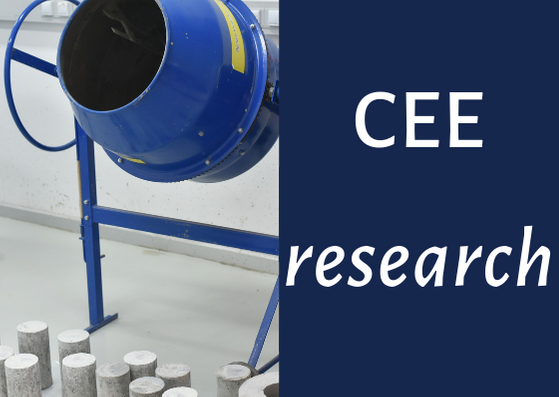
Contact us:
e-mail:
seds@nu.edu.kz
Телефон:
+7 (7172) 706423 , +7 (7172) 694536 (Program related questions)
Admissions Сall-center:
+7 (7172) 70 65 55
Program Overview
The Master of Science in Civil & Environmental Engineering (MSc-CEE) degree program is a specialized degree program offered by School of Engineering and Digital Sciences (SEDS) at Nazarbayev University (NU). Students are required to complete 120 ECTS credits, in 4 semesters, which satisfies requirements stipulated by the Bologna Process and the European Credit Transfer and Accumulation System (ECTS) for Master’s Degrees. The program is focusing on research and has been designed to provide advanced skills and a detailed knowledge base at the graduate level for individuals working in academia, industry, or research settings in Kazakhstan or throughout the world.
The MSc-CEE provides a comprehensive technologic and scientific preparation for engineers in 4 (four) key areas of Civil and Environmental Engineering:
1)Structural Engineering and Materials;
2)Geotechnical Engineering;
3)Environmental Engineering; and
4)Construction Management,
in perfect alignment with today´s technological challenges. A set of mandatory core courses guarantees competence in advanced mathematics, the 4 (four) key areas of the program, classic and novel research methods and effective oral and written communication in the science and technology domain.
By delivering an MSc at an international standard level, we are offering our master’s students future opportunities in terms of PhD and positions in research centers, locally or abroad.
Applicants applying to the program are expected to have:
1. An undergraduate degree (Bachelor’s degree or equivalent)
During the application period final year students may submit official current transcript for consideration.
2. A minimum CGPA of 2.75 out of 4.0 (or equivalent);
3. High level of English proficiency
The absolute minimum requirement for English language proficiency test reports for admission to the program is:
1) Overall IELTS test score of 6.5 (with sub-scores no less than 6.0) or the equivalent TOEFL score as posted on the ETS website;
2) The absolute minimum requirement for English language proficiency test report for conditional admission (NUZYP) is an overall IELTS test score of 5.5, with no more than one sub-score of 5.0, or the equivalent TOEFL scores as posted on the ETS website;
3) Applicants, at the discretion of the Admissions Committee, can be exempted from submitting the language proficiency test report if:
- one of their earlier academic degrees was earned in a country with English as the language of official communication, academic instruction and daily life;
- an undergraduate and/or graduate degree was earned in a program which was officially taught in English.
4. Strong reading, analytical, and mathematical skills as demonstrated by GRE test (optional). Although an official GRE score is not an essential requirement, an applicant can enhance her/his application with a competitive GRE score;
5. High motivation and strong interest in the program as outlined in a statement of purpose;
6. Curriculum vitae;
7. Two letters of recommendation.
Application package checklist:
1. Complete Application form;
2. National ID (for the citizens of the Republic of Kazakhstan) and passport (for international applicants);
3. Official document confirming name change (if applicable);
4. Bachelor’s (or equivalent) degree diploma with transcript;
During the application period final year students may upload official current transcript for consideration.
5. IELTS or TOEFL certificate valid as of date of online documents submission;
6. Document confirming English as the language of instruction (only for applicants who earned their degree in a program which was taught in English and request an exemption from submitting IELTS or TOEFL).
Applicants should provide a detailed certificate/reference from the university indicating the number and list of subjects completed in English.
7. Curriculum vitae (up to 2 pages);
8. GRE certificate valid as of date of online documents submission (if applicable);
9. Statement of purpose (up to 1 page);
10. Two confidential letters of recommendation (at least one academic reference) written within the last 12 months (to be provided by referees electronically or in hard copy after receiving an email request);
11. Consent for Applicant’s personal data processing (according to the template in applicant’s personal account).
Important:
All required documents indicated above (excluding letters of recommendation) must be uploaded by candidates to the Personal account before the indicated deadline.
All submitted documents shall be in English or with notarized English translation.
Submission of a complete application package does not guarantee admission to the Program.
Applicants recommended for admission must provide hard copies of all documents as requested by the Admissions Department within established period of time.
Applicants who obtained their degree diplomas/certificates from foreign education institutions must request their official transcripts to be sent directly to the University: 010000, Astana, Kabanbay Batyr Ave., 53, Nazarbayev University, Admissions Department.
Standardized test reports shall be sent by the official test administrator directly to the University.
Nazarbayev University Institutional Codes:
• GRE - 6496
• TOEFL – 6762



Aims and Objectives
The mission of the School of Engineering and Digital Sciences at Nazarbayev University is to contribute to the development of Kazakhstan in terms of:
- Educating students with engineering expertise to lead organizations and provide innovative solutions for complex technical issues of enterprises.
- Conducting innovative and pioneering basics of applied research that evolve the body of knowledge in Engineering through interdisciplinary collaboration with other schools and research centers at Nazarbayev University and leading universities worldwide.
- Advancing the professional development in engineering through our service to the professional community and providing lifelong learning opportunities for practitioners.
The M.Sc. (CEE) program aims to reflect the mission of the School of Engineering and accomplishes this by pursuing the following objectives:
1)Extend the knowledge and skills in advanced civil and environmental engineering analysis and design, particularly in using latest modelling and analysis techniques;
2)Develop solutions to civil and environmental engineering problems using in-depth knowledge and innovative ideas and techniques necessary for specialist engineers;
3)Develop skills to conduct high quality research in the field of civil and environmental engineering;
4)Provide awareness of the challenges in the profession and integrate engineering and non-engineering topics for leading organizations.

Graduate Attributes
The MSc-CEE program immerses the student within a scientific and technological ecosystem to favor their professional growth according to NU Graduate Attributes, which are very well aligned with the vision and mission of NU. These attributes are listed as:
1)Possess an in-depth and sophisticated understanding of their domain of study;
2)Be intellectually agile, curious, creative, and open-minded;
3)Be thoughtful decision makers who know how to involve others;
4)Be entrepreneurial, self-propelling and able to create new opportunities;
5)Be fluent and nuanced communicators across languages and cultures;
6)Be cultured and tolerant citizens of the world;
7)Demonstrate high personal integrity;
8)Be prepared to take a leading role in the development of their country.
The MSc program delivers these attributes by providing the students opportunities to be involved in: (a) working on individual and group assignments; (b) team-building exercises for developing decision-making skills; (c) designing tasks for developing creativity; (d) delivering and attending project-research presentations to polish their communication skills; and (e) engaging on group discussions among students and faculty in order to develop personal integrity and cultural tolerance. The same attributes are also addressed by the program learning outcomes.
Program Learning Outcomes
On successful completion of the program, graduates will be able to:
1)Analyze and design Civil and Environmental Engineering systems;
2)Apply advanced Civil and Environmental Engineering concepts to support policy making, development and management of Kazakhstan;
3)Review, analyze, and interpret the body of scientific literature and innovations in Civil and Environmental Engineering area;
4)Produce quality research by addressing global issues in Civil and Environmental Engineering with highest professional and ethical standards;
5)Evaluate and communicate their novel ideas and research findings to specialist and non-specialist audiences clearly and unambiguously.
Program Duration
The nominal MSc program duration is two years, while the maximum allowable duration can be extended up to two and half years (excluding leave of absence and deferment of admission; see “ACADEMIC POLICIES AND PROCEDURES FOR GRADUATE PROGRAMS OF THE AUTONOMOUS ORGANIZATION OF EDUCATION ‘NAZARBAYEV UNIVERSITY’” for further details).
| Year 1: Fall Semester (Semester 1) | ||
| TYPE | COURSE CODE & TITLE | ECTS |
| Program Core | MSC 601, Technical Communication | 6 |
| MSC 602, Advanced Applied Mathematics | 6 | |
| MCEE 603, Finite Element Methods | 6 | |
| MCEE 604, Advanced Soil Mechanics | 6 | |
| MCEE 605, Advanced Environmental Chemistry | 6 | |
| Year 1: Spring Semester (Semester 2) | ||
| TYPE | COURSE CODE & TITLE | ECTS |
| Program Core | MSC 600, Research Methods and Ethics | 6 |
| MCEE 600,Research Seminar | 6 | |
| MCEE 606, Advanced Project Management | 6 | |
| Elective | ELECTIVE 1 (Pick on from Electives Pool) | 6 |
| ELECTIVE 2 (Pick on from Electives Pool) | 6 | |
| Year 2: Fall Semester (Semester 3) | ||
| TYPE | COURSE CODE & TITLE | ECTS |
| Program Core | MCEE601, Master Thesis I | 24 |
| Elective | ELECTIVE 3 (Pick on from Electives Pool) | 6 |
| Year 2: Spring Semester (Semester 4) | ||
| TYPE | COURSE CODE & TITLE | ECTS |
| Program Core | MCEE 602, Master Thesis II | 24 |
| Elective | ELECTIVE 4 (Pick on from Electives Pool) | 6 |
Program Elective Courses
1) Area: Structural Engineering and Materials:
- Structural Dynamics and Earthquake Engineering (MCEE 700);
- Advanced Concrete Technology (MCEE 701);
- Structural Evaluation and Rehabilitation (MCEE 702);
- Advanced Pavement Design, Analysis and Rehabilitation (MCEE712);
- Advanced Concrete Design (MCEE 713).
2) Area: Environmental Engineering:
- Theory of Physio-chemical Treatment Processes (MCEE 703);
- Contaminated Site Management and Soil Treatment Technologies (MCEE 704);
- Environmental Modeling Development (MCEE 705);
- Advanced Wastewater Treatment (MCEE 714).
3) Area: Geotechnical Engineering:
- Geotechnical Earthquake Engineering (MCEE 707);
- Advanced Foundation Engineering (MCEE 708);
- Soil Improvement and Stabilization (MCEE 711).
4) Area: Construction Management:
- Building Information Modeling in Construction (MCEE 709);
- Green Building- Concept, Design, Construction, and Operation (MCEE 710);
- Sustainable Development (MCEE 715).
5) Miscellaneous:
- Renewable energy (MSC 700);
- Building Energy Analysis (MMAE 714).






